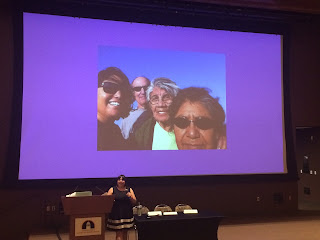On Feb. 27th,
Michael and I went to The Post-Modern Social Justice Symposium, hosted by the
Counseling and Social Change Club. This event took place in the Aztec Union
Theater on campus. Upon our arrival, we received a booklet with the schedule
for this six-hour long workshop and some information about the keynote speakers.
Dr. Sarah Kahn,
the Director of the Counseling and Social Change undergraduate minor, welcomed
everyone with a welcome speech. Then, Dr. Starck delivered an exciting and
passionate motivational introduction on why social change needs to be addressed
urgently among young professionals and college students. At the end of Dr.
Starck’s speech, she encouraged everyone to stand up and to shout “Social justice!” three times with her. As
a person coming from an introvert culture background, this format of the speech
seemed a little overwhelming for me. However, the speeches led us into a
curious stage where we were afforded a learning opportunity of diverse
identities.
The first speech,
Embracing Complexity and Breaking the
Binary: The Future of the LGBTQ+ Movement, was delivered by Liz Roccoforte.
She talked about the fluidity of one’s sexual and gender orientation, which
gave me a better understanding of the identities of LGBTQ groups. The most
fascinating part of this speech was the Gender Unicorn.
The unicorn was
used as a model to represent the many aspects of gender identity, gender
expression/presentation, sex assigned at birth, sexually attraction, and
romantic/emotional attraction. The unicorn provided a full picture of the
fluidity of sexual/gender orientation that have challenged the stereotypes that
people in general have about LGBTQ groups. This speech, along with a PBS
documentary Growing Up Trans,
reminded me how little the majority of heterosexual people acknowledge the way LGBTQ
people see themselves and the identity struggles they experience in everyday
life. In the documentary, transgender children started to explore their
identity at a very young age. For school psychologists and counselors, the
support we offer will be crucial to those children. The fundamental premise of
providing adequate service is to fully understand the interchangeable identity
of LGBTQ children and to stay professional and compassionate during counseling
sessions with them.
Elisa Barnett
gave the second speech, with the topic about biracial identity issues. She
utilized narratives to explain biracial identity and some common assumptions
people will make. One of the questions she asked the audience was, “When we ask
biracial people to give up one nationality or ethnicity, what are we asking
them to give up?” Answers such as culture, heritage, and identity were shouted
out from different corners of the theater. She acknowledged those answers and
continued, “We are asking them to give up all those factors of their lives. In
fact, we are asking them to give up a part of themselves”. I was deeply touched
by her statements. Personally, I’ve been going through some moments of merging
a new identity to my original one, that of an unsolidified Chinese. Inevitably,
conflicts and accords both appeared in my process. As school professionals, instead
of judging dogmatically on someone’s complex identity, our job is to help biracial
students to merge both their heritages and cultures more successfully so that
they can have a more efficient and more productive school life.
The last speech, Intersectional
Feminism, was presented by Patricia Ruiz. I was a little confused about the
title before the speech. Patricia made it clear to the audience during the
speech – feminism is in the center of an intersection, where one never knows from
which direction the criticism (e.g.: racism, sexism) is coming from. Patricia ended
her speech with a video of Astraea, a lesbian foundation for justice.
The implication for my future counseling in schools is that, as a school
psychologist, I need to respect that students, just like adults, have complex
identities that have been shaped from their diverse experiences. When we
utilize solution-focused counseling techniques, details like past experience
and identities are usually left out. It wouldn’t hurt if we spend a little more
time on building rapport and truly get to understand the students. Last, but
not least, this photo shows my goal of being a future school psychologist.
Jinhui Kiang





No comments:
Post a Comment